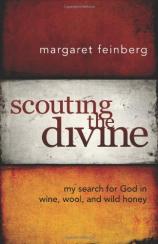Scouting the Divine: My Search for God in Wine, Wool, and Wild Honey
Review
Scouting the Divine: My Search for God in Wine, Wool, and Wild Honey
The basic idea of SCOUTING THE DIVINE isn’t all that unusual: let’s look at several themes that recur in the Bible as integral parts of the agrarian life and also as spiritual metaphors. Sheep and shepherds, farms and crops, bees and honey, vines and wines. The intrigue is in the way Margaret Feinberg chose to address the topic. She left her suburban home and sought out the authentic, back-to-nature experiences. “How can we learn to wait for the harvest when we live in a culture of easy access? How can I understand the promise of a land overflowing with milk and honey when the only honey I buy comes in a bear-shaped bottle at my local grocery store?”
“The hunger in my heart and mind compelled me to begin scouting the rounds in order to better understand God and his kingdom.”
The resulting book is written in a whimsical but hard-to-categorize style. There’s a suggestion of memoir: she tells you what she’s eating in a shepherdess’s home or at a California café. Sometimes Feinberg is in interview mode: she’s asking direct questions --- about the farm work and its spiritual implications --- to her country hosts and conversationally relaying their answers. And sometimes she quickly turns to a devotional application. For example, after the vintner says, “When you don’t tend a vineyard for a year, you suffer a lot of loss and damage. It takes years to get it back in balance and to where you had it before,” Feinberg immediately personalizes a spiritual point: “Looking back, I see times in my life when I have let my relationship with God go --- the weeds sprouting up…” Then sometimes she really focuses on the biblical narrative (sections titled “Digging in Scripture” and “Wine in the Scripture”).
I didn’t much like the book’s unconventional layout and design: four long “parts” (“The Good Shepherd”; “The Harvest”; “The Land of Milk and Honey”; “The Vine”), each with some 10 to 15 numbered subheads at the left margin (for example, “1.1 An Unexpected Encounter”; “1.2 Reconnecting”; “1.3 Loving the Flock”) that serve as outline points, not chapter titles.
The sheep chapter is the most engaging, the sheep themselves having names and personalities (unlike amber waves of grain). The bee chapter is the shortest; having grown up with a beekeeper, I sensed there was more to say here. I wished Feinberg had stayed at the apiary an extra day, walked out into a bee field on a sunny afternoon and flicked a stinger from her wrist and chewed beeswax like gum and stuck her finger into a honey pot and driven away with a stray bee flying around the backseat of the car. Stop. (That’s the kind of detail she charmingly includes in the sheep chapter --- cleaning the muck off her boots.)
Ultimately SCOUTING THE DIVINE is a good book. It’s an easy read with serious, in-depth content. Buy it. I think you’ll like it.
Reviewed by Evelyn Bence on September 29, 2009
Scouting the Divine: My Search for God in Wine, Wool, and Wild Honey
- Publication Date: September 29, 2009
- Genres: Christian, Christian Living, Spirituality
- Hardcover: 224 pages
- Publisher: Zondervan
- ISBN-10: 0310291224
- ISBN-13: 9780310291220





